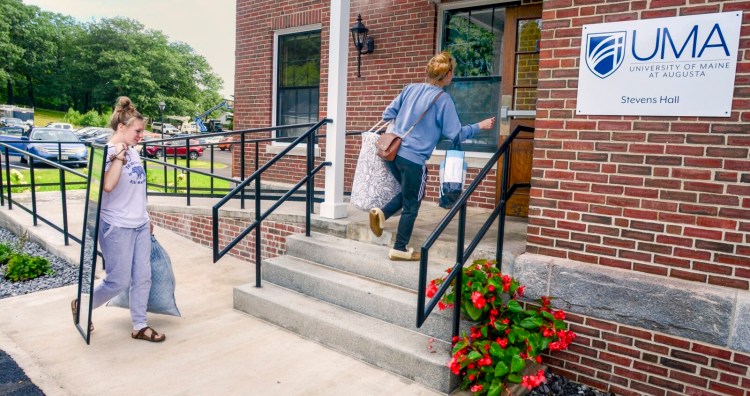HALLOWELL — The City Council approved two agreements Monday that should assist Stevens Commons developer Matt Morrill in securing funding for a second University of Maine at Augusta housing project.
Meanwhile, city officials said redevelopment of the once-blighted property is progressing well.
City Code Enforcement Officer Doug Ide said two new projects at the commons were given initial approvals by the Planning Board in August. The Erskine Building will be converted and join Stevens Hall, which opened last month, as another housing facility at UMA.
The second project, which was approved pending the sale of the Flagg-Dummer building, will provide market-rate apartments, according to plans.
City Manager Nate Rudy told the Kennebec Journal in August the market rate for a one-bedroom apartment in Hallowell is $800 to $1,200 a month.
The city’s Fire Department is located at Stevens Commons, as are a number of offices.
Morrill, of Mastway Development, bought the 53-acre Stevens Commons from the state for $215,000 in 2016. The city has given Morrill a $238,000 forgivable loan and $600,000 from a voter-approved bond package in 2017 for infrastructure improvements.
Ide said the Erskine Building’s sale is encouraging because it was the most-deteriorated building on the campus. The only existing building currently without development plans, he said, is the Cleveland Building, which is at the north end of the complex. It is for sale with an asking price of $600,000.
On Monday, the City Council quickly approved two subordination agreements related to the development of the Erskine Building. Rudy said the agreements lower the city’s position in the line of who would be repaid if Morrill’s development of the commons were to fail. The agreements make the city a junior interest to two lenders: Katahdin Trust Co. and Coastal Enterprises Inc.
Rudy said he recommended signing the agreements because the city wants the Stevens Commons development to be successful. This is not the first time the council has approved a subordination agreement at the commons. One was unanimously approved in December 2018.
Councilor Maureen Aucoin expressed discomfort with the agreement, saying she felt like the city’s hands were tied. She said it seemed the council was forced sign the agreement or else development at Stevens Commons would be held up.
“I think it’s kind of an unfortunate situation,” she said.
The $238,000 loan, which was forgivable if Morrill developed senior housing, would be excused when the Community Housing of Maine project is complete. Ide said construction has begun at the Central Building for that project, and Rudy said Monday it would likely be finished in 2020.
“When the doors open on that facility, … (Morrill’s company) will be relieved of the forgivable loan,” Rudy said.
Ide said Morrill has done a good job with the transformation of the existing buildings on campus, noting most of the buildings are now occupied or being developed. He said future plans, as laid out in a master plan before development began, show largely residential uses for the undeveloped portion of the property.
“The campus has evolved to a vision similar to the one that was in the master plan,” Ide said Monday. “The transformation is incredible inside and out.”
Councilors approve LED streetlight lease
Councilors also unanimously approved a six-year, $145,610 lease with Affinity LED Lighting to convert 232 streetlights in Hallowell to LED lights. The contract states the work should be completed by March 31, 2020.
At the end of the lease, the city will purchase the streetlights for $1. The first year’s payment will be $26,000, with five subsequent payments of $26,247. The lease will cost the city $157,237, including $11,627 in interest paid to the lender, Androscoggin Bank.
The city will have to purchase the lighting fixtures from Central Maine Power Co. for $25,474, which is included in the total cost.
Affinity LED Lighting, based in Dover, New Hampshire, will handle the streetlight fixture purchase and the installation of new lights. It has also reached an agreement with Farmingdale to convert its streetlights.
The change to LED lighting will result in a 65 percent reduction in annual kilowatt-hours of electricity used, and a 90 percent decrease in annual operating expenditures, from $43,424 to $4,399, according to the city.
Affinity has estimated the savings will offset the cost of the new lighting in less than four years. The change to LED is also expected to reduce the city’s carbon dioxide emissions by more than 50 tons annually.
Copy the Story LinkSend questions/comments to the editors.




Success. Please wait for the page to reload. If the page does not reload within 5 seconds, please refresh the page.
Enter your email and password to access comments.
Hi, to comment on stories you must . This profile is in addition to your subscription and website login.
Already have a commenting profile? .
Invalid username/password.
Please check your email to confirm and complete your registration.
Only subscribers are eligible to post comments. Please subscribe or login first for digital access. Here’s why.
Use the form below to reset your password. When you've submitted your account email, we will send an email with a reset code.